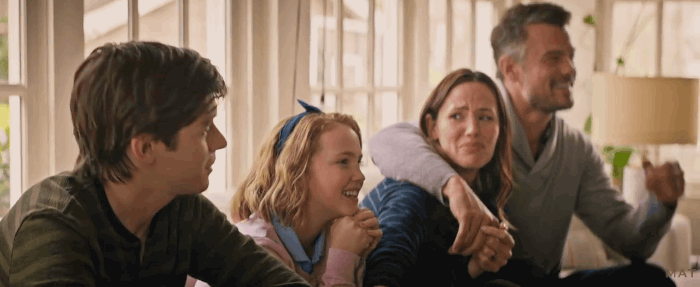Throughout life, it's important to remember that your mindset isn't the only one and, certainly, not the most important. This is an especially valuable concept during Pride Month, as we see words or behaviors that may either ignite us with anger or give us reassurance for a more inclusive future.
Before deciding to write this article, I had seen the movie "Love, Simon" four times. To understand a differing perspective, I sat down with someone from a different generation, and we watched the film together. As the first popular film dedicated to a same-sex love story in our generation, its existence sets as crucial precedent.
There were a few takeaways from this experience that I feel are worth sharing.
1. Depicting A Family

Simon doesn't spend a lot of time talking about his family, but what the screen shows you allows you to fill in some gaps. What's notable is their house and family dynamic. On one hand, both parents are present. There are no signs of abuse, drug use, parental fighting, sibling disagreements, or other family drama. This appeals to the older generation's idea of the perfect family, but this isn't necessarily the reality that the younger viewers are living in.
On the other hand, there are some freedoms that make this an ideal situation for younger viewers, such as his car, his liberal mother, and his ability to have sleepovers with friends of the opposite gender. Such things were openly criticized by my fellow movie-watcher. It's apparent that this family was meticulously chosen to ride the line between old and new world values as to appeal to the biggest audience possible. It's unfortunate that it doesn't represent reality.
2. Redefining Stereotypes
Another important representation of old world values is Ethan. Ethan is the school's only openly gay student and, for all intents and purposes, embodies what might come to mind when one thinks of what a homosexual male may look like. One of the reasons both myself and the individual I was with enjoyed this movie was the way Simon's character breaks almost every expectation that one may have about homosexuality. His appearance, clothing, and mannerisms are not stereotypical, and they reinforce the fact that identity is on the inside, not necessarily the outside.
In addition, Simon has more physically assertive moments in the movie as he stands up for himself to both Martin and the classmates that make fun of him in the cafeteria. These seemingly "masculine" actions are not typical while depicting stereotypical characters and help Simon build upon his originality.
3. The Timeliness of Reactions
 Giphy
GiphyWhen Simon comes out to his family, the individual I was with had an easier time relating to the parents than Simon. When I watched the movie alone, I didn't give much thought to the reaction of the parents because all that mattered to me, ignorantly, was the happy ending. From a parental perspective, my companion made the observation that the time between Simon coming out and his parents really talking to him about it was longer than what they thought it should have been.
As a parent, the individual stressed the importance of addressing crucial matters with their children sooner rather than later. To be fair, the movie had to progress through its highs and lows and could have risked losing an aspect of its happy ending if there was an open conversation when Simon first brought it up. Still, it made me realize that Simon spent that time in between in a state of uneasiness with his parents and, consequently, himself.
4. Putting Friends Before Foes

mssilverscreen.files.wordpress.com
Regarding the ending, the brief disagreement among friends was another weight on Simon's shoulders. I understood why Simon did what he did; he was trying to protect himself and his secret. Yes, the truth did get out eventually, but I think, in his mind, he was willing to do whatever was necessary to prevent that from happening as long as possible.
My companion disagreed with me, saying it was never right for him to put himself before his friends. I think that perspective is easy to have when you aren't in the position of desperately trying to withhold something as personal and possibly life-altering as revealing a sexuality different from the one that is expected of you.
5. How It All Ends

I thought, and still think, the ending was heartwarming and, like every sappy ending to every romance movie, wrapped things up perfectly with a bow. However, the word my company used was "pathetic". I couldn't help but wonder if that mindset was stemming from an expectation of masculinity from the boy that was waiting for his love to show up. Is it also pathetic when a woman waits for a man?
Overall, it was a beneficial experience to have a discussion with someone who sees the world a different way. It allowed for me to not only think about the literal message of the movie, but also some of the subliminal statements it was making.
I genuinely hope that more movies like "Love, Simon" are made in the future not just for entertainment's sake, but also for the sake of continuing the spread of understanding, conversation, and cute actors.


















